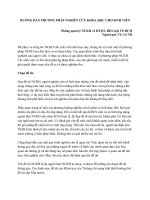PHUONG PHAP NGHIEN CUU
Bạn đang xem bản rút gọn của tài liệu. Xem và tải ngay bản đầy đủ của tài liệu tại đây (99.76 KB, 7 trang )
<span class='text_page_counter'>(1)</span>Cantho University School of Education English Education Department -----------------------------------------------------------. TRIEU KHANH HUY 7098122 Marks:………………. Research methods in Education RESEARCH PROPOSAL. English Translation & Interpretation Juniors’ Problems in Studying Listening & Speaking Part I - Rationale Listening and speaking skills are essential to obtain a good job (Stephen E. Lucas, 2009; Adrienne Robertson, n.d.). In fact, when employers appreciate their staffs, they will look at the ability of listening and speaking of the staffs because most of the employers take for granted that good listening and speaking is similar to good English knowledge. Therefore, they will not choose the candidates who do not have good listening and speaking skills but other skills. This fact makes clear that English listening and speaking skills are extremely important. Listening and speaking are also two very important skills in studying English. To the students studying English professionally, the capacity of listening and speaking decides whether theirs comprehension good or not and the results of listening and speaking exams. They also are most essential factors that directly impact on abilities of English communication. In order words, the students who are studying English can not communicate with foreigners effectively if they have bad listening and speaking skills. This thing will lead to many serious problems. Therefore, a good ability of listening and speaking is quite necessary for students whose majors related to English, especially English Translation & Interpretation. According to the English Translation & Interpretation (ETI) Semester Score Reports from 2009-2011, ETI majored juniors’ listening and speaking performance is not high. To a student who studies ETI, the good ability of listening and speaking is more important than other majors. It even keeps the decisive role whether this student can work or not..
<span class='text_page_counter'>(2)</span> From these facts, we have paid much attention to this problem because it affects seriously the quality of studying and realized that we need to carry out the research on the problems they are having and focus to give out possible solutions. Above are some background things about the mentioned issue in the research. And the following parts after Rationale are Literature Review, Research Aims, Research Questions, Hypotheses and Research Methods (consisting of Design, Participants, Instruments, and Materials).. Part II – Literature Review Listening & Speaking: Definition and Role According to the website www.ccsf.edu, listening is the process of receiving, attending to, and assigning meaning to aural stimuli (Wolvin and Coakley, 1985, p. 74). Listening skill is a communication technique that requires the listener to understand, interpret, and evaluate what they hear. Listening is “a complex, problem-solving skill” and an active and interactive process. From the collected data from www.sil.org, speaking is an interactive process of constructing meaning that involves producing, receiving and processing information (Brown, 1994; Burns 14 and Joyce, 1997). Its form and meaning are dependent on the context in which it occurs, including the participants themselves, their collective, experiences, the physical environment, and the purpose for speaking. The combination of listening and speaking skills is the basic mode of oral communication. In fact, they are the most frequently used skills in all issues in life, especially in academic environment. Many experienced textbook and methodology manuals writers have argued that listening and speaking play mutually reinforcing roles in a literate classroom community of learner. Teachers and students who talk to each other about literature, writing, presentation, research, or performance are also likely to listen to each other as they share plans, emotions, ideas, and information. It is estimated that lose to 90% of class time in high school and college is spent to discuss and lecture (Robertson, 1964). As a result, a good capacity of English listening and speaking skills will help English-majored students perform their studying well.. Studying Listening & Speaking.
<span class='text_page_counter'>(3)</span> Although good listening and speaking skills are extremely important, the problems often occur in many English-majored students during their studying. The author Suthee Khamkaew (2009) have done a research about the needs and problems in English listening and speaking skills of students in the foreign languages university, Srinakharinwirot University. We obtained some results from collecting data by observing this research. We realized that listening and speaking problems often occurred during these students’ studying. The main listening problems were a variety of English accents, being unable to catch the main idea, and listening expression. It is possible that some of the students cannot understand when listening to a variety of accents, the main ideas, and expression because they just contact with native speakers or accents. Similarly, the speaking problems often occurred during their studying. The main speaking problems were saying expressions, speaking in complete sentences without mistakes grammar rules and English pronunciation, especially the ending sounds /s/ and /z/. Alex Case (2008) in the research “Why Your Students Have Problems with Listening Comprehension” presented that the main causes of problems in listening and speaking were come from these reasons: (1) There was a common focus on English grammar, rather than on communicative competence at schools. (2) There were also few opportunities to use the language outside the classroom. (3) Students were lack of grammatical awareness. (4) The weakness of conversational English was reinforced by the lack of exposure to good English speakers at school. She mentioned that these factors were main barriers that affect students’ abilities of speaking and listening. If a student cannot cope with these barriers, he/she will not communicate fluently and effectively in English. In the research, she strongly stated that there was a need of renovation in language training programs that were concerned with selecting lists of linguistic features such as grammar, pronunciation, and vocabulary as well as experiential content such as topics and themes. To provide the useful training program of listening and speaking skill, Wilson (2011) in the article “How to Learn English” suggested the model to establish and maintain an effective training program as following: 1) Topics: The topics that are related to the functional categories: greeting and offering help, giving advice and instructions, asking for information, giving directions, describing problems … 2) Teaching Materials: The teaching materials that can support all Englishmajored in learning English are as follows: English for specific purposes text, English textbook, on-line materials….
<span class='text_page_counter'>(4)</span> 3) Learning Activities: All students can practice a variety of learning a deeper understanding of English listening and speaking skills as follows: pair work, simulation, presentation, group discussion, e-learning, In short, authors of above researches have pointed that listening and speaking skills have important role, and most of the students have problem with them. In fact, mastering these skills is quite helpful for the students in their studying. It can be ensure that if students can realize their problems, they will study these skills better.. Part III – Research Aim(s) The aim of this research is to find out the problems of ETI-majored juniors in studying listening and speaking English and possible solutions to improve their performance. In addition, we also expect other English-majored students can apply the result of this research to improve their listening and speaking skills.. Part IV – Research Questions Our research tries to solve two following questions: 1. What problems do ETI-majored juniors have in studying listening and speaking English? 2. What are their learning methods for listening and speaking English?. Part V – Research Hypotheses Based on the related literature and research questions, it was hypothesized that ETI juniors have problems of not having English environment to practice listening and speaking outside classrooms. Since then, ETI junior would find out ways to solve the problems. The study also hypothesized ETI juniors’ methods of studying English speaking and listening are different including: Active Methods: a. Interactive English practice with friends and native speakers b. Self-study and group study after school In-active Methods:.
<span class='text_page_counter'>(5)</span> a. b.. Rote learning Little or no study after school. Part VI – Research Method 1. Design: The present experimental study will be directed by following a five scale questionnaire design to get answers of the research question and operate the hypotheses. We will give the questionnaire to all ETI junior who take part in our research, and then the questionnaire will then be collected to test results if our hypotheses are true. Furthermore, we will set up questions that will be delivered to whole participants to know other problems ETI juniors have and their other ways of studying listening and speaking. 2. Instrument: In the study, we use questionnaires. These questionnaires will focus on finding the problems that ETI juniors are having and the ways they are studying listening and speaking. In addition, we use some question to know students’ experiences in studying listening and speaking. 3. Participants: There will be 1 researcher 82 students from ETI course 35. They are all of level at the second years, and in general, they have studied English about 9 years. Because they have the same level, we can be easy to evaluate them. Their age rank from 18 to 20. Besides, there will be some researcher’s assistants who will help research prepare, delivery and collect the questionnaires, especially analyze the data. 4. Procedure: a. Designing the questionnaire. b. Piloting the questionnaire.
<span class='text_page_counter'>(6)</span> c. Adjusting the questionnaire questionnaire. d. Delivering and collecting the. e. Analyzing the data. f. Reporting the results/finding. Part VII – Expected Outcome(s) and Significant Of Research Finding(s) After this study, we expect that ETI juniors not only know more their listening and speaking problems but also can strongly improve their listening and speaking skills by determining the problems. In addition, we expect that the results of this study will be helpful for all English major students and non- English major students in Can Tho University. Hopefully, through some studying listening and speaking experiences collected in the questionnaires, we can conclude and suggest some effective study methods for ETI students and other English majored students in Can Tho University.. Part VIII – References 1. Suthee Khamkaew, Needs and Problems in English Listening and Speaking Skills: A Case Study of the Foreign Languages University, Srinakharinwirot University. 2. Alex Case (2008), Why Your Students Have Problems with Listening Comprehension, retrieved Saturday, October 1st 2011, from speaking.html 3. How to Learn English. Retrieved Saturday, October 01, 2011, from 4. Stephen E. Lucas, The Art of Public Speaking (10th Ed., pp.4-5, 50-58). Retrieved Saturday, October 01, 2011, from
<span class='text_page_counter'>(7)</span> 5. Speaking Skill. Last modified 23October 1998. Retrieved Saturday, October 01,2011, from ltrlrnngprgrm/SpeakingSkill.htm 6. What is listening? (n.d.). Retrieved Saturday, October 01, 2011, from
<span class='text_page_counter'>(8)</span>









